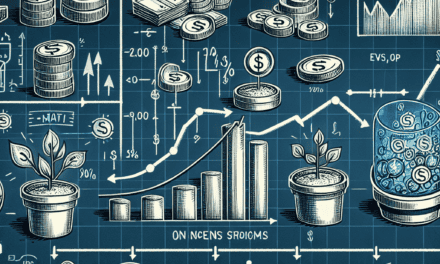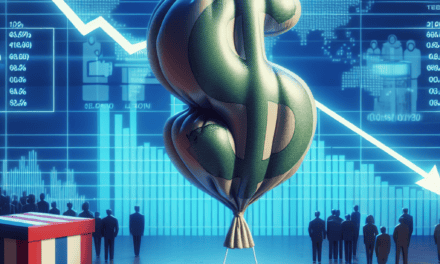“Unlock Potential: Invest in Berkshire Hathaway’s Expanding Cash Reserves.”
Introduction
As Berkshire Hathaway’s cash reserves continue to swell, investors are increasingly faced with the question of whether to invest in this financial behemoth. The conglomerate, led by the legendary Warren Buffett, has long been a staple in the portfolios of those seeking stable, long-term growth. With its diverse range of subsidiaries and significant equity holdings, Berkshire Hathaway offers a unique investment opportunity. However, the growing cash reserves, which have reached unprecedented levels, raise questions about the company’s future investment strategies and potential returns. This situation presents a compelling case for investors to evaluate the implications of these cash reserves on Berkshire Hathaway’s overall financial health and its ability to capitalize on future opportunities.
Understanding Berkshire Hathaway’s Cash Reserve Strategy
Berkshire Hathaway, the multinational conglomerate led by the legendary investor Warren Buffett, has long been a subject of fascination for investors worldwide. One of the most intriguing aspects of Berkshire Hathaway’s financial strategy is its substantial cash reserves, which have been steadily growing over the years. As of the latest reports, these reserves have reached unprecedented levels, prompting investors to ponder whether this accumulation of cash is a signal to invest in the company or a cause for concern.
To understand the implications of Berkshire Hathaway’s cash reserve strategy, it is essential to delve into the reasons behind this accumulation. Warren Buffett, known for his prudent investment philosophy, has often emphasized the importance of maintaining a robust cash position. This approach provides the company with the flexibility to seize opportunities as they arise, particularly during times of economic uncertainty or market volatility. By holding significant cash reserves, Berkshire Hathaway can swiftly deploy capital into attractive investments without the need to liquidate existing assets or incur debt.
Moreover, the growing cash reserves reflect Buffett’s cautious outlook on the current investment landscape. In recent years, the market has experienced elevated valuations, making it challenging to find undervalued assets that meet Berkshire Hathaway’s stringent investment criteria. Consequently, rather than rushing into potentially overpriced investments, the company has opted to bide its time, waiting for more favorable conditions. This patience underscores Buffett’s commitment to value investing, a strategy that has served Berkshire Hathaway well over the decades.
However, while the accumulation of cash reserves demonstrates financial prudence, it also raises questions about the opportunity cost of holding such a large amount of idle capital. Critics argue that by not deploying these funds into productive investments, Berkshire Hathaway may be missing out on potential returns. In a low-interest-rate environment, the returns on cash holdings are minimal, which could lead to a drag on overall performance. Therefore, investors must weigh the benefits of financial flexibility against the potential drawbacks of underutilized capital.
Transitioning to the potential impact on investors, it is crucial to consider how Berkshire Hathaway’s cash reserve strategy aligns with individual investment goals. For those who prioritize stability and risk management, the company’s conservative approach may be appealing. The substantial cash reserves act as a buffer against economic downturns, providing a sense of security in turbulent times. Furthermore, Berkshire Hathaway’s track record of capitalizing on market dislocations suggests that when opportunities do arise, the company is well-positioned to generate significant returns.
On the other hand, investors seeking immediate growth may find the current strategy less attractive. The opportunity cost associated with holding large cash reserves could result in slower capital appreciation compared to more aggressive investment strategies. Therefore, potential investors must carefully assess their risk tolerance and investment horizon before deciding whether Berkshire Hathaway aligns with their financial objectives.
In conclusion, Berkshire Hathaway’s growing cash reserves are a testament to Warren Buffett’s disciplined investment philosophy and cautious market outlook. While this strategy provides financial flexibility and risk mitigation, it also presents challenges related to opportunity cost. Ultimately, the decision to invest in Berkshire Hathaway should be guided by an individual’s investment goals and risk appetite, taking into account the company’s unique approach to capital management. As the market evolves, the effectiveness of this strategy will continue to be a topic of keen interest and debate among investors.
The Impact of Cash Reserves on Berkshire Hathaway’s Stock Performance
Berkshire Hathaway, the multinational conglomerate led by the legendary investor Warren Buffett, has long been a focal point for investors seeking stable and long-term growth. As of late, the company has been amassing significant cash reserves, a development that has sparked considerable interest and debate among market analysts and investors alike. Understanding the implications of these growing cash reserves on Berkshire Hathaway’s stock performance requires a nuanced examination of both the company’s strategic positioning and the broader economic context.
To begin with, cash reserves are often viewed as a double-edged sword in the corporate world. On one hand, they provide a company with the flexibility to seize opportunities, such as acquisitions or investments, without the need to secure external financing. This is particularly relevant for Berkshire Hathaway, which has a history of making strategic acquisitions that have contributed to its robust portfolio. On the other hand, excessive cash reserves can be perceived as a sign of inefficiency, suggesting that the company is unable to identify profitable ventures or is overly cautious in its investment approach.
In the case of Berkshire Hathaway, the accumulation of cash reserves can be attributed to a combination of factors. The company’s diverse range of businesses, spanning insurance, utilities, manufacturing, and retail, generates substantial cash flow. Moreover, Buffett’s disciplined investment philosophy, which emphasizes value and long-term growth, often results in a cautious approach to deploying capital. This cautiousness is further compounded by the current economic climate, characterized by market volatility and uncertainty, which may prompt a more conservative stance.
The impact of these cash reserves on Berkshire Hathaway’s stock performance is multifaceted. In the short term, investors may express concern over the opportunity cost of holding large amounts of cash, particularly in a low-interest-rate environment where returns on cash are minimal. This could potentially lead to a stagnation in stock price growth, as investors may prefer companies that actively reinvest their earnings into high-growth opportunities. However, it is crucial to consider the long-term perspective, which is where Berkshire Hathaway’s strategy often shines.
Historically, Buffett has demonstrated an uncanny ability to deploy capital effectively during periods of market distress, capitalizing on undervalued assets and distressed companies. The substantial cash reserves position Berkshire Hathaway to act decisively when such opportunities arise, potentially leading to significant value creation for shareholders. Furthermore, the company’s strong balance sheet and liquidity provide a buffer against economic downturns, enhancing its resilience and appeal as a safe haven for investors.
In addition, the presence of substantial cash reserves may also signal potential for shareholder returns through mechanisms such as share buybacks or dividends. While Berkshire Hathaway has traditionally been reticent to pay dividends, preferring to reinvest earnings, the possibility of share buybacks remains a viable option. By repurchasing shares, the company can enhance shareholder value by reducing the number of outstanding shares, thereby increasing earnings per share.
In conclusion, while the growing cash reserves at Berkshire Hathaway may raise questions about immediate stock performance, they also underscore the company’s strategic flexibility and resilience. For investors with a long-term horizon, the potential for opportunistic investments and shareholder returns could outweigh the short-term concerns. As always, the decision to invest should be guided by a thorough analysis of one’s investment goals and risk tolerance, keeping in mind the unique attributes that have made Berkshire Hathaway a stalwart in the investment community.
Analyzing Warren Buffett’s Investment Philosophy
Warren Buffett, often referred to as the “Oracle of Omaha,” has long been a beacon of wisdom in the investment world. His company, Berkshire Hathaway, is renowned for its robust investment portfolio and prudent financial strategies. As of late, Berkshire Hathaway’s cash reserves have been growing significantly, prompting investors to ponder whether this is an opportune moment to invest in the conglomerate. To make an informed decision, it is essential to delve into Buffett’s investment philosophy and understand how it aligns with the current financial landscape.
Buffett’s investment philosophy is rooted in value investing, a strategy that involves purchasing undervalued stocks with strong fundamentals and holding them for the long term. This approach is predicated on the belief that the market will eventually recognize the true value of these stocks, leading to substantial returns. Consequently, Buffett’s focus is not on short-term market fluctuations but rather on the intrinsic value of a company. This long-term perspective has been a cornerstone of Berkshire Hathaway’s success, allowing it to weather economic downturns and capitalize on market opportunities.
The growing cash reserves at Berkshire Hathaway can be seen as a reflection of Buffett’s cautious approach in the current economic climate. With global markets experiencing volatility and uncertainty, maintaining a substantial cash position provides the flexibility to seize investment opportunities as they arise. This strategy aligns with Buffett’s well-documented preference for having “dry powder” ready to deploy when attractive investments become available. Therefore, the burgeoning cash reserves should not be viewed as a sign of inactivity but rather as a strategic positioning for future growth.
Moreover, Buffett’s emphasis on investing in companies with strong competitive advantages, or “economic moats,” further underscores his commitment to long-term value creation. By selecting businesses with sustainable competitive edges, Berkshire Hathaway ensures that its investments can withstand competitive pressures and generate consistent returns over time. This focus on quality and durability is particularly relevant in today’s rapidly changing business environment, where technological advancements and shifting consumer preferences can quickly erode a company’s market position.
In addition to his investment acumen, Buffett’s leadership and ethical standards have fostered a culture of trust and integrity at Berkshire Hathaway. This reputation enhances the company’s ability to attract and retain high-quality management teams, which is crucial for the successful execution of its investment strategies. Furthermore, Buffett’s willingness to adapt and learn from past experiences demonstrates a level of humility and pragmatism that is rare among business leaders. This adaptability ensures that Berkshire Hathaway remains resilient and responsive to evolving market conditions.
While the decision to invest in Berkshire Hathaway ultimately depends on individual financial goals and risk tolerance, understanding Buffett’s investment philosophy provides valuable insights into the company’s strategic direction. The growing cash reserves, coupled with a steadfast commitment to value investing and strong corporate governance, suggest that Berkshire Hathaway is well-positioned to capitalize on future opportunities. As such, potential investors may find comfort in the knowledge that their investment is guided by one of the most respected and successful investors of our time.
In conclusion, the question of whether to invest in Berkshire Hathaway as its cash reserves grow is not merely a matter of timing but also of aligning with a proven investment philosophy. By appreciating the principles that have driven Berkshire Hathaway’s success, investors can make a more informed decision about whether this iconic conglomerate aligns with their own financial objectives.
The Role of Cash Reserves in Economic Downturns
As investors navigate the complexities of the financial markets, the role of cash reserves in economic downturns becomes a focal point of discussion. Berkshire Hathaway, under the stewardship of Warren Buffett, has long been a subject of interest due to its substantial cash reserves. This financial strategy, often debated among investors, raises the question of whether investing in Berkshire Hathaway is prudent as its cash reserves continue to grow.
To understand the significance of cash reserves, it is essential to consider their function during economic downturns. Cash reserves provide a buffer against market volatility, allowing companies to maintain operations without resorting to debt or asset liquidation. In times of economic uncertainty, having substantial cash reserves can be a strategic advantage, enabling companies to seize opportunities that arise from market dislocations. For Berkshire Hathaway, this strategy has historically allowed it to acquire undervalued assets and companies during downturns, thereby enhancing its long-term value.
Moreover, cash reserves offer flexibility and security, which are crucial during periods of economic instability. Companies with significant cash reserves can weather financial storms more effectively, as they are less reliant on external financing. This independence from capital markets can be particularly advantageous when credit conditions tighten, and borrowing becomes more expensive or difficult. For Berkshire Hathaway, this financial autonomy has been a cornerstone of its investment philosophy, allowing it to act decisively when attractive investment opportunities present themselves.
However, the accumulation of cash reserves is not without its criticisms. Some investors argue that holding excessive cash can lead to opportunity costs, as these funds could potentially generate higher returns if invested elsewhere. In the case of Berkshire Hathaway, the growing cash reserves have occasionally sparked debates about whether the company is missing out on lucrative investment opportunities. Critics suggest that the company could enhance shareholder value by deploying more of its cash into high-return investments or by returning capital to shareholders through dividends or share buybacks.
Despite these criticisms, it is important to recognize that the strategic use of cash reserves can be a differentiating factor in a company’s ability to navigate economic downturns. For Berkshire Hathaway, the decision to maintain substantial cash reserves is deeply rooted in its investment philosophy, which prioritizes long-term value creation over short-term gains. This approach has historically served the company well, allowing it to capitalize on market opportunities that others may not be able to pursue due to financial constraints.
In conclusion, the role of cash reserves in economic downturns is a critical consideration for investors evaluating Berkshire Hathaway as a potential investment. While the growing cash reserves may raise questions about opportunity costs, they also provide a strategic advantage that can enhance the company’s resilience and flexibility in uncertain economic environments. As such, investors must weigh the benefits of financial stability and strategic opportunity against the potential for higher returns from alternative investments. Ultimately, the decision to invest in Berkshire Hathaway should be informed by an understanding of the company’s long-term investment strategy and its proven track record of navigating economic challenges with prudence and foresight.
Comparing Berkshire Hathaway’s Cash Reserves to Competitors
Berkshire Hathaway, the multinational conglomerate led by the legendary investor Warren Buffett, has long been a subject of fascination for investors and financial analysts alike. One of the most intriguing aspects of the company is its substantial cash reserves, which have been steadily growing over the years. As of the latest reports, Berkshire Hathaway’s cash pile has reached an impressive level, prompting many to wonder how it compares to its competitors and what implications this might have for potential investors.
To begin with, it is essential to understand the significance of cash reserves for a company like Berkshire Hathaway. Cash reserves provide a cushion against economic downturns, allowing a company to weather financial storms without resorting to debt or other costly measures. Moreover, they offer the flexibility to seize investment opportunities as they arise, a strategy that has been a hallmark of Buffett’s investment philosophy. In this context, Berkshire Hathaway’s growing cash reserves can be seen as a strategic advantage, positioning the company to capitalize on market fluctuations and potential acquisitions.
When comparing Berkshire Hathaway’s cash reserves to those of its competitors, it becomes evident that the company stands out in the industry. Many large corporations maintain significant cash reserves, but few can match the scale of Berkshire Hathaway’s financial war chest. For instance, technology giants like Apple and Microsoft also boast substantial cash holdings, yet their business models and investment strategies differ significantly from those of Berkshire Hathaway. While tech companies often reinvest their cash into research and development or return it to shareholders through dividends and buybacks, Berkshire Hathaway’s approach is more conservative, focusing on long-term value creation through strategic acquisitions and investments.
Furthermore, the comparison with other conglomerates reveals Berkshire Hathaway’s unique position. Companies such as General Electric and 3M, which operate in diverse industries, also maintain cash reserves to support their operations and growth initiatives. However, Berkshire Hathaway’s diversified portfolio, which spans insurance, utilities, manufacturing, and more, provides a broader base for leveraging its cash reserves. This diversification not only mitigates risk but also enhances the company’s ability to allocate capital efficiently across various sectors.
In addition to its cash reserves, Berkshire Hathaway’s investment strategy sets it apart from its competitors. The company’s focus on acquiring undervalued assets and holding them for the long term aligns with Buffett’s value investing principles. This approach has historically yielded impressive returns, further bolstering the company’s financial position. As a result, Berkshire Hathaway’s cash reserves are not merely a static asset but a dynamic tool for generating future growth and profitability.
Considering these factors, potential investors might view Berkshire Hathaway’s growing cash reserves as a positive indicator of the company’s financial health and strategic acumen. However, it is crucial to recognize that investing in Berkshire Hathaway involves more than just assessing its cash position. Investors should also consider the company’s overall performance, management expertise, and market conditions. While the substantial cash reserves provide a degree of security and flexibility, they are just one component of a complex investment landscape.
In conclusion, Berkshire Hathaway’s cash reserves, when compared to its competitors, highlight the company’s robust financial foundation and strategic foresight. These reserves, coupled with a disciplined investment approach, position Berkshire Hathaway as a formidable player in the market. For investors seeking stability and long-term growth potential, the company’s cash reserves may indeed be a compelling factor to consider. Nonetheless, a comprehensive evaluation of all relevant aspects is essential before making any investment decisions.
The Future of Berkshire Hathaway’s Investment Opportunities
As Berkshire Hathaway continues to amass substantial cash reserves, investors are increasingly curious about the potential implications for future investment opportunities. The conglomerate, led by the legendary Warren Buffett, has long been a beacon of financial stability and strategic acumen. However, the growing cash pile, which has surpassed $140 billion, raises questions about how the company plans to deploy these resources effectively. Understanding the potential avenues for investment and the strategic mindset of Berkshire Hathaway is crucial for investors considering whether to allocate their capital to this iconic firm.
To begin with, the accumulation of cash reserves at Berkshire Hathaway is not a new phenomenon. Historically, Buffett has maintained a conservative approach, preferring to hold substantial liquidity to capitalize on opportunities during market downturns. This strategy has served the company well, allowing it to make significant acquisitions when valuations are attractive. However, in recent years, the challenge has been finding suitable investments that meet Buffett’s stringent criteria for value and potential returns. This has led to a growing cash reserve, which some investors view as a double-edged sword. On one hand, it provides a buffer against economic uncertainty; on the other, it raises concerns about the opportunity cost of holding such a large amount of idle capital.
Moreover, the current economic landscape presents both challenges and opportunities for Berkshire Hathaway. With interest rates remaining relatively low, the returns on cash and cash-equivalent investments are minimal. This environment puts pressure on the company to seek higher-yielding opportunities. However, the competitive nature of the market, coupled with high valuations in many sectors, complicates the search for attractive investments. Despite these hurdles, Berkshire Hathaway’s management has demonstrated a keen ability to identify undervalued assets and industries poised for growth. This track record instills confidence that the company will eventually deploy its cash reserves in a manner that enhances shareholder value.
In addition to traditional acquisitions, Berkshire Hathaway has the option to invest in emerging sectors that align with long-term trends. For instance, the growing emphasis on sustainability and renewable energy presents a potential avenue for investment. The company’s existing stake in BYD, a Chinese electric vehicle manufacturer, exemplifies its willingness to explore opportunities in this space. Furthermore, the healthcare sector, with its ongoing innovations and demographic tailwinds, could also attract Berkshire’s attention. By diversifying its portfolio into these burgeoning areas, the company can position itself to benefit from future growth while mitigating risks associated with over-reliance on any single industry.
Furthermore, Berkshire Hathaway’s investment strategy is not solely focused on external acquisitions. The company has a history of reinvesting in its existing portfolio of businesses, enhancing their operational efficiency and competitive positioning. This internal investment approach can yield substantial returns, particularly in industries where Berkshire has deep expertise and influence. Additionally, the potential for share buybacks remains a viable option for utilizing cash reserves. By repurchasing its own shares, Berkshire can increase the value of remaining shares, providing a direct benefit to shareholders.
In conclusion, while the growing cash reserves at Berkshire Hathaway may initially appear as a challenge, they also represent a significant opportunity. The company’s disciplined investment philosophy, combined with its ability to adapt to changing market conditions, suggests that it is well-positioned to capitalize on future opportunities. For investors, the decision to invest in Berkshire Hathaway should consider not only the current cash reserves but also the company’s proven track record of strategic investments and its potential to navigate an evolving economic landscape.
Evaluating the Risks and Rewards of Investing in Berkshire Hathaway
As investors continually seek opportunities to maximize their returns, the question of whether to invest in Berkshire Hathaway becomes increasingly pertinent, especially as the conglomerate’s cash reserves swell. With a reputation for prudent financial management and a diverse portfolio, Berkshire Hathaway, led by the legendary Warren Buffett, has long been a staple in the investment community. However, the growing cash reserves, which have recently surpassed $150 billion, present both potential risks and rewards that merit careful consideration.
To begin with, the substantial cash reserves held by Berkshire Hathaway can be seen as a double-edged sword. On one hand, these reserves provide the company with significant flexibility and security. In times of economic uncertainty or market volatility, having a large cash cushion allows Berkshire Hathaway to weather financial storms without being forced to liquidate assets at unfavorable prices. Moreover, this liquidity positions the company to capitalize on investment opportunities that may arise during market downturns, potentially acquiring undervalued assets at a discount. This strategic advantage aligns with Buffett’s well-documented investment philosophy of being “greedy when others are fearful.”
On the other hand, the accumulation of cash reserves also raises questions about the opportunity cost associated with holding such a large amount of idle capital. In an environment where inflationary pressures are mounting, the real value of cash can erode over time. Investors might be concerned that these reserves are not being deployed in a manner that maximizes shareholder value. While Berkshire Hathaway’s conservative approach has historically served it well, some critics argue that the company could enhance returns by investing more aggressively in high-growth sectors or by returning capital to shareholders through dividends or share buybacks.
Furthermore, the current economic landscape presents unique challenges and opportunities that could influence Berkshire Hathaway’s investment strategy. With interest rates at historically low levels, the returns on cash and cash-equivalent investments are minimal, which may prompt the company to seek higher-yielding alternatives. However, the potential for rising interest rates in the future could impact the valuation of existing investments, particularly in interest-sensitive sectors such as utilities and financial services, which are significant components of Berkshire Hathaway’s portfolio.
In addition to these financial considerations, the leadership transition at Berkshire Hathaway is another factor that investors must weigh. While Warren Buffett’s investment acumen is unparalleled, the eventual succession plan remains a topic of speculation. The company’s future performance will depend not only on the strategic decisions made by Buffett’s successors but also on their ability to maintain the corporate culture and investment discipline that have been hallmarks of Berkshire Hathaway’s success.
In conclusion, investing in Berkshire Hathaway as its cash reserves grow involves a careful evaluation of both risks and rewards. The company’s strong financial position and diversified portfolio offer a measure of stability and potential for opportunistic investments. However, the opportunity cost of holding large cash reserves, coupled with the uncertainties surrounding leadership succession and macroeconomic conditions, necessitates a thoughtful analysis. For investors with a long-term perspective and a tolerance for potential short-term fluctuations, Berkshire Hathaway may still represent a compelling investment opportunity. Nonetheless, as with any investment decision, it is crucial to consider one’s individual financial goals and risk appetite before committing capital.
Q&A
1. **What is Berkshire Hathaway’s current cash reserve status?**
Berkshire Hathaway’s cash reserves have been growing, reaching significant levels, often exceeding $100 billion.
2. **Why are large cash reserves significant for Berkshire Hathaway?**
Large cash reserves provide Berkshire Hathaway with the flexibility to make substantial investments or acquisitions when opportunities arise, potentially leading to significant returns.
3. **How does Berkshire Hathaway’s investment strategy impact its attractiveness to investors?**
Berkshire Hathaway’s strategy of investing in undervalued companies and its track record of successful acquisitions make it an attractive option for investors seeking long-term growth.
4. **What role does Warren Buffett play in investment decisions at Berkshire Hathaway?**
Warren Buffett, as the chairman and CEO, plays a crucial role in investment decisions, leveraging his expertise and experience to guide the company’s investment strategy.
5. **How do market conditions affect the decision to invest in Berkshire Hathaway?**
Market conditions can impact the availability of attractive investment opportunities for Berkshire Hathaway, influencing its ability to deploy cash reserves effectively.
6. **What are the potential risks of investing in Berkshire Hathaway?**
Potential risks include market volatility, changes in leadership, and the possibility of unsuccessful investments or acquisitions.
7. **What is the long-term outlook for Berkshire Hathaway as an investment?**
The long-term outlook remains positive due to its strong financial position, diversified portfolio, and proven investment strategy, though it is subject to market and economic conditions.
Conclusion
Investing in Berkshire Hathaway as its cash reserves grow can be an attractive option for several reasons. The company’s substantial cash reserves provide it with significant flexibility to capitalize on investment opportunities, weather economic downturns, and potentially return value to shareholders through buybacks or dividends. Additionally, Berkshire Hathaway’s strong track record under the leadership of Warren Buffett and its diversified portfolio of businesses and investments offer a level of stability and potential for long-term growth. However, potential investors should also consider the company’s current valuation, the broader economic environment, and their own investment goals and risk tolerance. Ultimately, while Berkshire Hathaway’s growing cash reserves are a positive indicator, investment decisions should be based on a comprehensive analysis of these factors.





